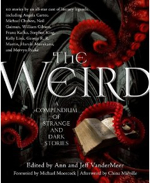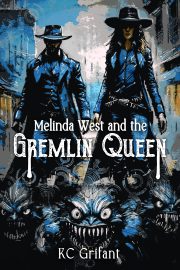Guest Post: Dreaming Well: Does the Future of Publishing Need More Imagination?
by Jeff VanderMeer
 For the past three or four years, the book world has been inundated with advice, predictions, and knowing winks about the next phase of what it means to be a writer. We’re told to exploit social media, to cater to our fans, to turn to self-publishing through e-books, to eschew copyright in favor of giving readers material for free. But what value does any of this actually have? What actual results, and at what cost? Is the salvation for writers the same thing that will wind up killing off good books? Who is rendered invisible by all of this, and what does it mean for the future of literary quality?
For the past three or four years, the book world has been inundated with advice, predictions, and knowing winks about the next phase of what it means to be a writer. We’re told to exploit social media, to cater to our fans, to turn to self-publishing through e-books, to eschew copyright in favor of giving readers material for free. But what value does any of this actually have? What actual results, and at what cost? Is the salvation for writers the same thing that will wind up killing off good books? Who is rendered invisible by all of this, and what does it mean for the future of literary quality?
Just for those who don’t know me, I’ve been a writer for over 25 years, with novels out from major and indie publishers, as well as self-published titles. I’ve got multiple awards nominations, and wins, and write-ups in the Los Angeles Times, Washington Post, San Francisco Chronicle, and elsewhere. I’ve run an award-winning publishing company. I help run a teen writing camp and write book reviews for major national newspapers. I’m also the author of what is still the only internet/new media-based book on what it means to be a writer in the modern era, Booklife, which has such spin-off sites as Booklifenow. I’m not at all shy about using social media, and getting my hands dirty with promotion and all of the other things that we are increasingly told we must do.
But I feel passionately that some of the information we are getting is increasingly wrong and motivated by selfishness and, yes, to some degree, a form of hyperbolic illogic. We are so hung up on predicting the next big thing, on getting in on the next gold rush when it comes to ways for authors to promote themselves and market their work that we often seem to be active participants in our own destruction. We are voluntarily committed at times to dismantling those elements of traditional publishing that actually work and adopting the new simply because it’s shiny and seems to offer an easy way out. We may talk now about accessibility and visibility instead of distribution and publicity, and the delivery system and format of books may be changing, but those are just matters of terminology and translation. At the same time, we’re not able to truly dream well about what e-books might mean beyond things like making them look more like videogames or annotating them. Honestly, who cares? That’s pretty much dressing something up, not dreaming well.
The problem right now really isn’t the “tyranny” of big NYC commercial publishers or an Amazon monopoly. The problem is the virus of mediocre and received ideas coursing through the collective brains of the book world, infecting too many of its writers, commentators, reviewers. It’s a kind of fundamentalism at its heart, and we want to believe in it because it’s easy to do so. Then we don’t have to think for ourselves and we can also worship at the altar of a God of E-Plenty.
Just a few prominent examples, although there are more, and more subtle, cases…
—War on copyright and the fervent belief that content should be free. This belief isn’t based on any scientific facts showing that this will benefit the majority of writers (the midlist, which often is the bedrock of literary quality) but often based on anecdotal experience from gatekeepers who mistake their own immense personal power for signal boost as distributing evenly across the book culture.* When it most assuredly does not. The idea, meanwhile, that non-US/British Commonwealth writers do not in fact want some form of international copyright in place is just plain wrong for the most part, not to mention insulting to the wealth of diverging opinions across countries, regions, and traditions. (This is leaving aside the ridiculous length of copyright in the US/UK right now; it is too long.)
–Mega-selling self-published authors war on traditional publishing, specifically the Mighty Konrath. This belief, again, isn’t based on scientific fact—note the recent study showing less than 10 percent of self-published authors make any kind of money at all—but on anecdotal evidence related to a unique situation in already having an audience built up through traditional publishing. Any crusade against traditional publishing is selfish to the extreme—it wants to replace diverse ways to publication with One True Way. The same call is often taken up by budding writers, because it can be very seductive to think publication is so very, very much closer than ever before…even if time put into getting rejected can be extremely important to developing writers. Self-publishing is a tool and like any other tool it can be used well or poorly. Putting it on a pedestal is a pointless exercise. I AM BOLDING THIS STATEMENT SO I DON’T GET ANY COMMENTS ABOUT HOW I HATE SELF-PUBLISHING, BECAUSE I DON’T. (Any such comments will be deleted.)
–Advocating against the use of an agent. I’ve seen more than one experienced writer who should know better rail against the use of an agent in the new publishing atmosphere. All I can say is, if you think agents are evil sycophants who want to suck all of your money out of you and cheat you, feel free. I’ll be over in this corner getting a lot more done for more money because of my agent.
–No one at New York publishing houses edits books any more. This is something I really find to be propaganda in the worst sense, in the context of bolstering the case for self-publishing (the case for which doesn’t need bolstering, depending on the context). All I can say is that everywhere I’ve been published in NY, I have had amazing editors who rolled up their sleeves and suggested, in some cases, major changes that had a big impact on the quality of the book in question. And many of my friends who also publish with NY publishers will tell you the same thing. This little inaccuracy used to be relatively benign back in the day, but it now more and more harmful, since it also suggests that since writers with big houses don’t get edits, editing in general really isn’t necessary. Not true.
–Claiming you know how things are going to look five years down the road and recommending strategies based on your Sacred Knowledge. There are a lot of different elements in play right now in a market in flux. No one can really be sure of what book publishing will look like in five years except that e-books will be a hugely important part of it. But one thing you can be sure of: that future will have built-in tumors and cysts due to your promulgation of shit-ass ideas now, infecting the mind-stream of the internet and taking hold when they needn’t have.
–Telling writers to establish some social media presence well in advance of finishing or selling a novel or other type of book. Another one-size-fits-all approach that isn’t useful for all writers or all kinds of books. For some writers, depending on their personality, it is downright destructive. For others, it is like being a hamster in a wheel trying to power your career, and expending lots of energy for little gain. Writers over-extending themselves, losing track of their art, all concerned that otherwise they’ll be rendered invisible.
This invisibility concerns me the most, especially in the context of those who scoff at traditional publishing these days. Trad publishing offers something to the shy writer, the introverted writer, the writer who will *always* trip over themselves trying to yank at the levers of social media. And that thing is advocacy and support. Is the advice we’re being given actually coming with the subtext that “if you’re not good at social media and selling yourself, don’t become a writer”? If so, fuck that. Some of my favorite writers wouldn’t know a facebook from an effing hole in the wall and yet, gasp, somehow manage to have careers.
Taken together, advocates for the wholesale dismantling of the current system and, to a lesser extent (lesser because it’s not as prevalent) other advocates who too frequently defend the inadequacies of the current system represent the biggest threat to the majority of writers. By spreading a more-or-less ideological virus that is then repeated by ever-growing numbers of people who do not stop to analyze what they then put out there as gospel, a self-fulfilling prophecy occurs that may do long-term damage to the ability of writers to survive in this new age of publishing.
As noted, I’m no luddite. I use social media strategically and well. I write very surreal books that reach a larger audience than they otherwise would because of these tools. But I also know what doesn’t work, and that old-fashioned word-of-mouth and many of the traditional ways still hold true. I am not at all interested in being complicit in the impoverishment of the literary community by adopting new ways without thinking them through thoroughly first. I also am not at all interested in some becoming more visible at the expense of making others into ghosts.
Now, of course, you’ll ask if I have the answers. Well, I don’t. I’m smart enough to know I don’t, but also savvy enough to know bullshit solutions when I see them, and not to promulgate them to new writers. We live in an exciting age for books, but the jury’s out on whether we’ll have enough imagination to make it a Renaissance or a Dying Fall. And lest anyone misunderstand, I am as at-fault as anyone in not yet having been able to see clearly on this issue. I just know there must be better ideas out there, better ways of doing things. Before we become Locked In to just One Idea or Two Ideas.
* In other cases, artists coming in from other media suggest ludicrous things like “all you have to do is have your own popular band and then you can write a novel that easily reaches people.” Yes. Form your own musical group. Then use that popularity to write a novel. Next idea, please.
 Jeff VanderMeer has had novels published in fifteen languages, won multiple awards, and made the best-of-year lists of Publishers Weekly, the San Francisco Chronicle, the LA Weekly, and many others. His award-winning short fiction has been featured on Wired.com’s GeekDad and Tor.com, as well as in many anthologies and magazines, including Conjunctions, Black Clock, and in American Fantastic Tales (Library of America). His nonfiction has appeared in the New York Times Book Review, the Washington Post, The Huffington Post, the Los Angeles Times, and Salon.com.
Jeff VanderMeer has had novels published in fifteen languages, won multiple awards, and made the best-of-year lists of Publishers Weekly, the San Francisco Chronicle, the LA Weekly, and many others. His award-winning short fiction has been featured on Wired.com’s GeekDad and Tor.com, as well as in many anthologies and magazines, including Conjunctions, Black Clock, and in American Fantastic Tales (Library of America). His nonfiction has appeared in the New York Times Book Review, the Washington Post, The Huffington Post, the Los Angeles Times, and Salon.com.
With his wife Ann, he launched WeirdFictionReview.com, which has become one of the world’s most robust sources for fiction and nonfiction related to the weird. Their latest offering is The Weird, a 750,000-word anthology covering 100 years of weird fiction.
This post first appeared on Jeff VanderMeer’s blog, Ecstatic Days. Author photo by Keyan Bowes.


